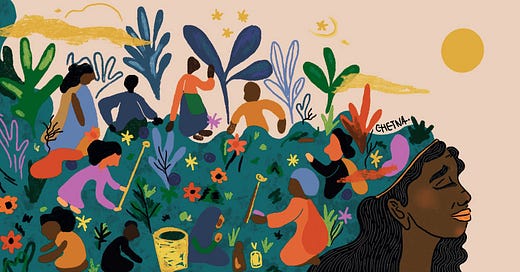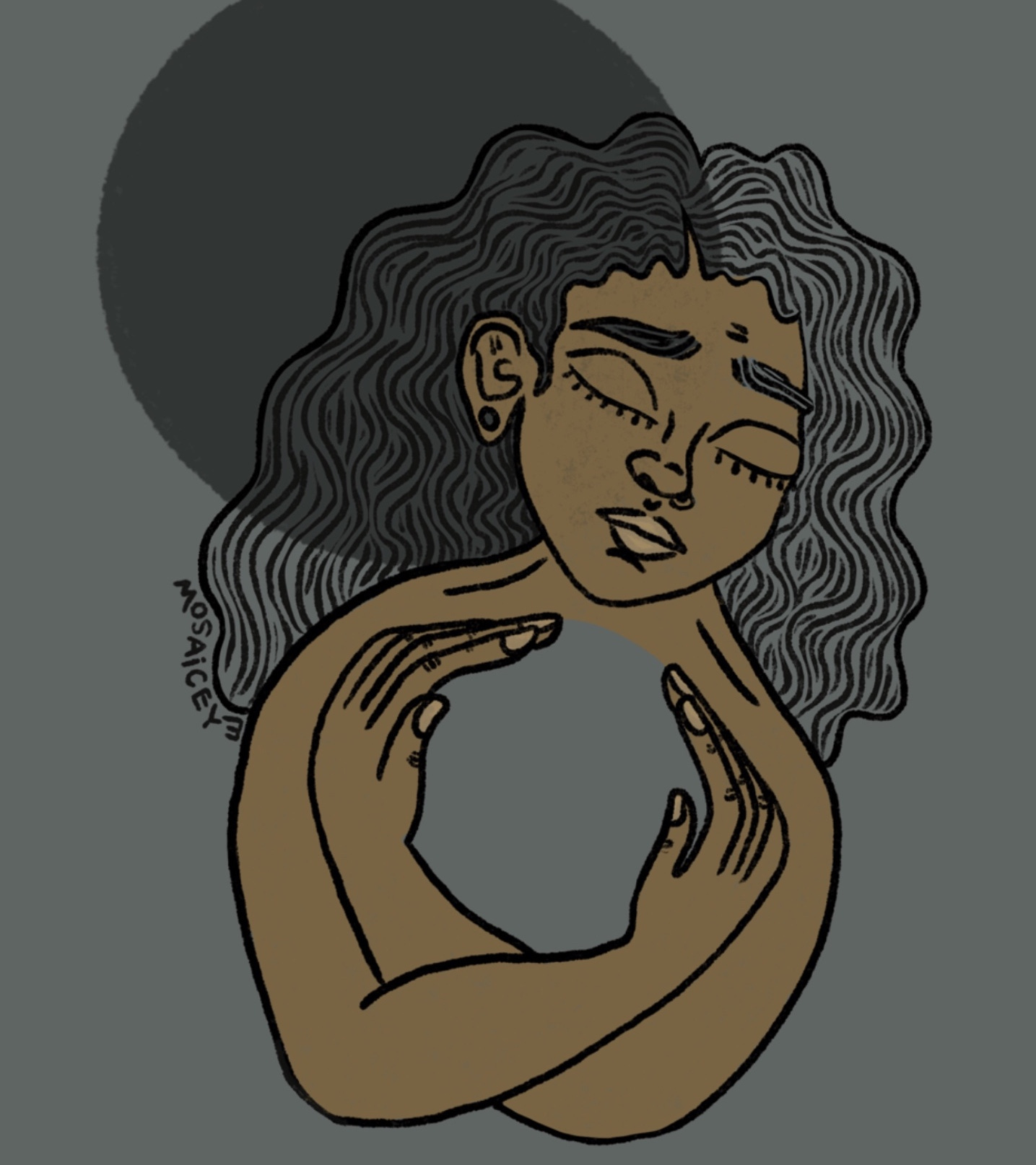We – Shilpa and Chetna – got together to build upon our last collaborative post, The Bully Within. While at a beautiful retreat for South Asian creatrixes, we had another emergent conversation about internal, interpersonal and systemic ‘domination’ and how to shift into more interdependent ways of being and doing together.
Shilpa: Wow! It’s really good to re-read our article, and remember the themes we were looking at. The more I work on myself, and with others, especially around conflict, the more I recognize how crucial the inner work is. I can’t even imagine interpersonal or systemic change anymore, without embedding it in that inner work. Like how can I and we grow the world we want to see without healing that bully within?
Chetna: Forreal. Doing the inner work and healing the inner bully can be really confronting. Something I’ve been noticing recently that keeps me from taking accountability is an attachment to my pain stories – beliefs I (and we) are attached to that are focused on what’s wrong and are rooted in wounding or fear. Examples are “people are not to be trusted” or “I’m not good enough” or “they are against us.” While threat and inadequacy may be a reality in certain contexts, more often, these pain stories are the ego’s way of justifying a need to dominate, control, divide and hate- myself or others.
Shilpa: What you’re saying reminds me of the first year of my work in India with Shikshantar. My team and I started with critical analysis, finding faults in the existing education system and trying to convince people what was wrong with it. Unfortunately, people would either feel paralyzed and just shut down in the conversation; or get defensive and say there was no alternative; or would say we were depriving people of the high level of education we had had. It was exhausting and wasn’t growing new partnerships and collaborations, much less our own imaginations and creativity.
Thankfully, we learned about the practice of Appreciative Inquiry, which focuses on what’s working, inspiring, healing, transforming, and who is a part of it, and where it’s happening. Instead of fixating on what’s wrong, it invites us to look at what we want to grow more, based on what we love, what we celebrate, what gives us life energy. It immediately led to different outcomes: so many people bringing in their passions, co-creating awesome projects, collaborating across many divides, and really practicing the kind of education – co-learning, unlearning, self-directed learning, community-oriented learning – that we were hoping to see more of in the world. It was a game-changer.
Chetna: Oh man, I bet it was! I’m thinking about what a practice like appreciative inquiry can do for our nervous systems. When I’m looping with the negativity in what’s wrong or not working, or the stories of pain, loss or inadequacy, I can easily dwell in the dorsal vagal state of my nervous system that leaves me feeling helpless and isolated, like I’m in a dark basement. Or, I may move into the sympathetic activation of my nervous system and be moved to fight and defend. Sadly, I see a lot of circling between dorsal vagal shutdown and sympathetic activation in social justice circles; going between burnout and rage, burnout and rage, again and again.
Appreciative inquiry can bring us into the social engagement state of the nervous system. Social engagement is a natural state, and one of curiosity, creativity and connection. It’s radical activism to operate from this state of our nervous systems, despite all there is to be enraged about in the world and all the sticky pain stories that feel so righteous and valid.
Shilpa: I love the neuroscience/nervous systems link you’re making, Chetna. The mindset I (or we) are operating from totally influences the kind of work I (or we) will create! What you’re saying also brings up, for me, the difference between my pain stories and my grief. In my pain story, I separate from others. I want to control the pain and so I block myself from others, from the moment. I can even block myself from myself. In my grief, I connect with others. I let myself feel and witness others’ feelings. And then I don’t feel alone, but rather that I belong in a great ocean of humanity.
I was recently in Las Vegas for some work, and a colleague walked me through this Community Healing Garden. A mass shooting happened in Vegas in 2017 at a country music festival, and 58 people were killed. And within a week, the City of Las Vegas, with dozens of supporters and volunteers, stood for a collective commitment to healing, kindness, and compassion, and transformed a patch of desert into an incredible garden with altars for each person, desert trees and plants, and tiles and rocks painted by local children with messages of love. It was so moving. And, it inspired my colleagues and I to imagine more communal spaces for grieving and healing, since they seem to be needed everywhere.
Chetna: Wow, what a beautiful way to channel collective grief. Grief feels like a river flowing, sometimes intense and strong, and sometimes tender and low, but always in motion. And pain stories feel like a desert with cracks. I personally can get very dehydrated and then rigid from my pain stories!
In Mosaiceye’s membership community for creative changemakers, The River, we have a monthly grief circle called To the Water, where we gather and voice the grief that’s present for each of us, without fixing it or judging it. Sometimes I go in with clear grievances, and other times I end up uncovering something that felt stuck in me that needed to be named in the space. I notice how present, clear and connected the group feels after.
Shilpa: And the space for grief is not counter to what you and I were saying about appreciative inquiry. It’s actually a corollary. The more I grieve, the more I free myself from blockages, the more open I become to possibilities. Every time I have seen a community grieve together, not too long after I witness a huge burst of creativity. It happens in YES! Jams all the time. It happened in Las Vegas too.
Chetna: Yes! I too have noticed such spaciousness, creation and deep connections after shared times of grief. I’m thinking back to the 2016 election when Trump became president and hopelessness, fear and shock, as well as grief was present in me and so many of the communities I was belonging to. Yet, as we reckoned and grieved what had become (and what I hope will never become again), there were so many phenomenal organizations and movements that began or gained prominent during the Trump administration for climate justice, women’s rights, gun violence prevention, services and advocacy for immigrants and asylum seekers, and so much more.
The thing is, grief may require daily tending. I think about disappointment as a form of grief. When I, or others, bypass disappointment, it can easily jump to punitive action like blaming, shaming, or controlling others, as in “I am disappointed in you.” For example, when I instead of taking responsibility for my disappointment at someone not doing the dishes, my inner bully judges them as messy or lazy, and I make up petty rules, or send passive-aggressive texts to get them to do the damn dishes. This is a small example, but it speaks to the daily ways I have to acknowledge my disappointments so that I can approach situations with directness, compassion and clarity, rather than judgment or the need to control.
Shilpa: Your reflections on disappointment have me thinking about bigger systems as well as smaller ones, like my family. Last year, I underwent such a mindset shift when I let go of my pain story and expectations, took time for grief, and also invited in more appreciative inquiry. I stopped holding on to the disappointment in what my parents couldn’t do for me, in terms of emotional support, and started being grateful for what they could do for me, in terms of their generosity and care for my physical well-being. I feel so much more relaxed and easy with them now. And because our mirror neurons fire when around each other, I think they feel that ease, and can be more relaxed with me too. And when they can’t, or I can’t, I feel so much lighter in letting it flow, knowing it’s a moment in our journey, and not taking it as evidence for my pain story.
Chetna: That lightness feels like liberation, to me. Such clarity, creativity and connection becomes possible when we are in active and regular practice of grieving and grieving collectively, instead of bolstering the inner bully, or the outer bully. As Francis Weller wrote, “We discover how sorrow shakes us and breaks us open to depths of soul we could not imagine. Grief offers a wild alchemy that transmutes suffering into fertile ground.” What a time to let our grief fertilize the ground we walk on, as we craft this path to more love, justice, belonging and freedom.
We’d love to hear your experiences and thoughts on the inner bully, outer bully, and healing grief for walking the path of creativity. Please share in the comments.









The work of appreciative inquiry is something I will take into my work life (thank you!) but the personal side of it really grabbed me. My parents don’t acknowledge my queerness, and I have so much more grief around that than I know. I can’t change their religious or political beliefs. But I can practice gratitude for what I do get from them instead of only feeding my resentment. I can practice this and grieve. It doesn’t justify their actions, but it will allow me to feel more open and expansive.
“I stopped holding on to the disappointment in what my parents couldn’t do for me, in terms of emotional support, and started being grateful for what they could do for me…”
I awoke this morning feeling depressed - the political scene, climate change, things at home. Reading your post, I identified my feeling as grief. Thank you for this. I realized I needed to go deeper and turned to this poem by David Whyte:
The well of grief
Those who will not slip beneath
the still surface on the well of grief,
turning down through its black water
to the place we cannot breathe,
will never know the source from which we drink,
the secret water, cold and clear,
nor find in the darkness glimmering,
the small round coins,
thrown by those who wished for something else.